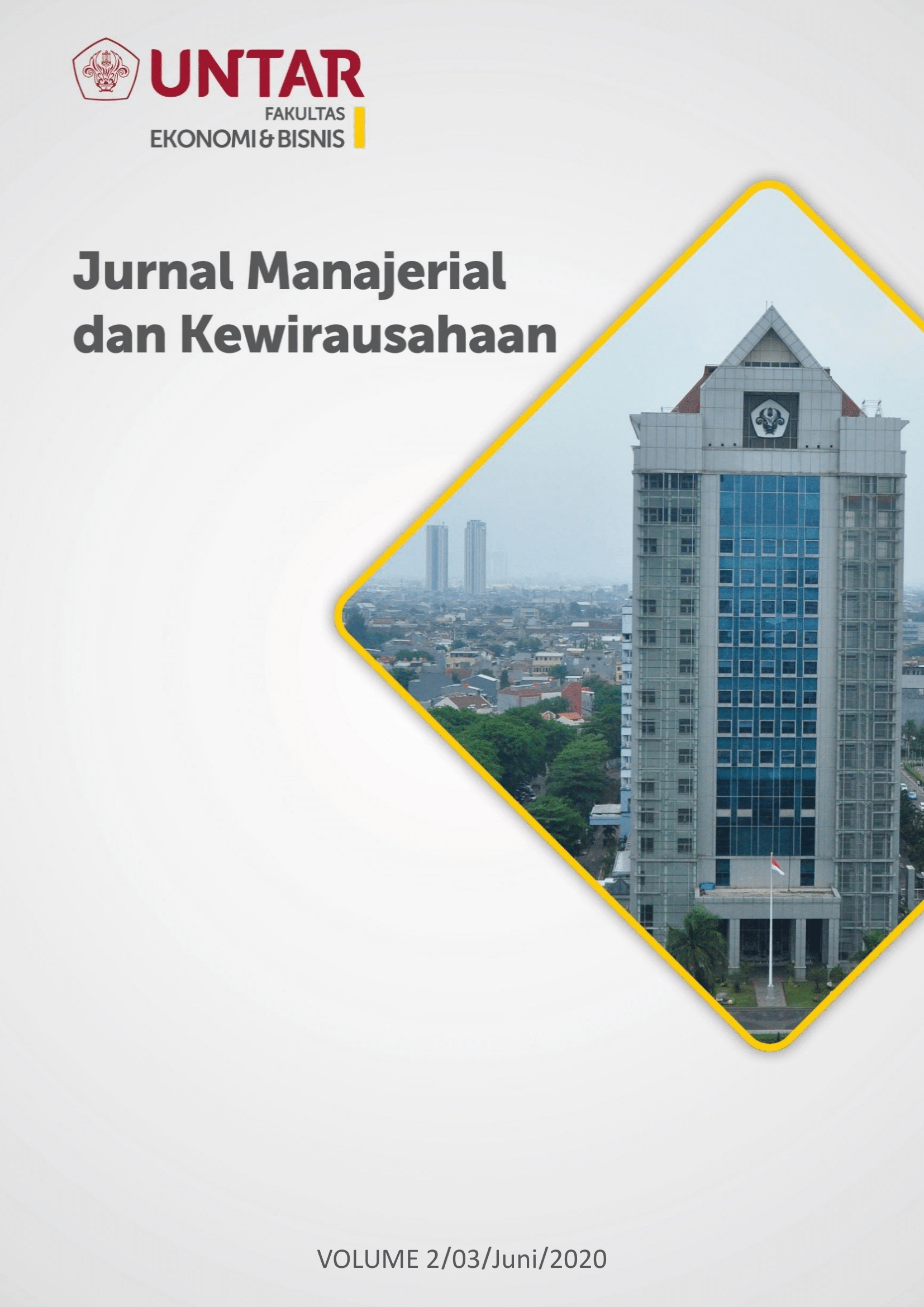Pengaruh Financial Attitude, Financial Behavior, Financial Knowledge, dan Risk Tolerance terhadap Financial Satisfaction
Main Article Content
Abstract
The purpose of this study is to examine the effect of Financial Attitude, Financial Behavior, Financial Knowledge and Risk Tolerance on Financial Satisfaction. The sample in this study is all residents who already have income or income in the Jakarta area. The sample was chosen by the non-probability sampling method, amounting to 190 respondents by distributing questionnaires online. The data analysis technique used is Structural Equation Modeling (SEM) which is assisted with the assistance of the Smart-PLS program.3.3.2. The results of this study are that there is a positive influence of Financial Attitude on Financial Satisfaction, there is a positive influence of Financial Behavior on Financial Satisfaction, and there is a positive influence of Financial Knowledge on Financial Satisfaction. While the results obtained in this study indicate there is no effect of Risk Tolerance on Financial Satisfaction.
Tujuan dari penelitian ini adalah untuk meneliti mengetahui pengaruh Financial Attitude, Financial Behavior, Financial Knowledge dan Risk Tolerance terhadap Financial Satisfaction. Sampel pada penelitian ini adalah seluruh penduduk yang sudah memiliki pendapatan atau penghasilan di wilayah Jakarta. Sampel dipilih dengan metode non-probability sampling yang berjumlah 190 responden dengan penyebaran kuesioner secara online. Teknis analisis data digunakan adalah Structural Equation Modeling (SEM) yang dibantu dengan bantuan program Smart-PLS.3.3.2. Hasil dari penelitian ini adalah terdapat pengaruh positif Financial Attitude terhadap Financial Satisfaction, terdapat pengaruh positif Financial Behavior terhadap Financial Satisfaction, dan terdapat pengaruh positif Financial Knowledge terhadap Financial Satisfaction. Sedangkan hasil yang didapat pada penelitian ini menunjukkan tidak terdapat pengaruh Risk Tolerance terhadap Financial Satisfaction.
Article Details
Section
This work is licensed under a Jurnal Muara Ilmu Ekonomi dan Bisnis Creative Commons Attribution-ShareAlike 4.0 International License.,/p>
References
Ahmad, K. A., Hasan, R., and Idris, F. (2017). Influence of Financial Literacy on Financial Satisfaction with Financial Behavior as Moderating Variable. Asian Journal of Technical Vocational Education and Training, 2, 1-9.
Ali, A., Rahman, M. S. A., & Bakar, A. (2015). Financial Satisfaction and the Influence of Financial Literacy in Malaysia. Social Indicators Research, 120(1), 137–156.
Arifin, A. Z. (2017). The Influence of Financial Knowledge, Control and Income on Individual Financial Behavior. European Research Studies Journal, 20(3), 635-648.
Arifin, A. Z. (2018). Influence Factors toward Financial Satisfaction with Financial Behavior as Intervening Variable on Jakarta Area Workforce. European Research Studies Journal, 21(1), 90-103.
Candra, J. W., & Memarista, G. (2015). Faktor-Faktor yang Mempengaruhi Financial Satisfaction pada Mahasiswa Universitas Kristen Petra. Finesta, 3(2), 1–6.
Chen, H., dan Volpe, R. P. 1998. “An Analysis of Personal Financial Literacy Among College Students”. Financial Services Review, 7(2), 107-128.
Chowa, G. A., Despard, M., & Akoto, I. O. (2012). Financial Knowledge and Attitudes of Youth in Ghana. Diener, E., Oishi, S., & Lucas, R. E. (2003). Personality, Culture, and Subjective Well-Being: Emotional and Cognitive Evaluations of Life. Annual Review of Psychology Journal, 54(1), 403–425.
Falahati, L., Sabri, M. F., & Paim, L. H. (2012). Assessment a model of financial satisfaction predictors: Examining the mediate effect of financial behavior and financial strain. World Applied Sciences Journal, 20(2), 190-197.
Furnham, A. (1984). Many sides of the coin: The psychology of money usage. Personal and Individual Differences, 5(5), 501-509.
Gerrans, P., Campitelli, G., & Speelman, C. (2013). The Relationship Between Personal Financial Wellness and Financial Well Being: A Structural Equation Modelling Approach. Journal of Family and Economic Issues, 5-44.
Hira, T. K., and Mugenda, O. M. (1998). Predictors of Financial Satisfaction: Differences Between Retirees and Non-retirees. Journal of Financial Counseling and Planning, 9(2), 75-84.
Jeong, Hanna (2004). Risk Tolerance and Financial Satisfaction. International Journal of Human Ecology, 5, 35-43.
Jogiyanto, (2007). Sistem Informasi Keperilakuan. Edisi Revisi. Yogyakarta: Andi Offset.
Joo, S., & Grable, J. E. (2004). An Exploratory Framework of the Determinants of Financial Satisfaction. Journal of Family and Economic Issues, 25(1), 25-50.
Manulife Investor Sentiment Index Study (2016) “What is the Biggest Regret of Investors” at available at https://www.manulife.co.id/content/dam/insurance/id/id/documents/manulife-investorsentiment-index/Manulife_MISI10_4Feb2016.pdf.
Sindonews, (2020) “Menkeu Akui Pendapatan Masyarakat Kecil Turun Imbas Wabah Corona” at available at https://ekbis.sindonews.com/read/96010/33/menkeu-akui-pendapatanmasyarakat-kecil-turun-imbas-covid-19-1594303644.
OJK, (2019). “Siaran Pers Survei OJK 2019: Indeks Literasi Dan Inklusi keuangan Meningkat” at available at https://www.ojk.go.id.
Pratiwi, O. (2019). Pengaruh Financial Knowledge, Financial Behavior, Financial Efficacy dan Risk Tolerance Terhadap Financial Satisfaction. JURNAL DINAMIKA MANAJEMEN DAN BISNIS, 2(2), 24-30.
Sahi, S. K., & Kalra, S. K. (2013). Measuring Financial Risk taking using a dual preference approach for determination of Financial Satisfaction. Indian Institute of Management, Ahmedabad.
Saurabh, K., & Nandan, T. (2018). Role of Financial Risk Attitude and Financial Behavior As Mediators In Financial Satisfaction. South Asian Journal of Business Studies, 7(2), 207– 224.
iao, J. J. (2015). Consumer Economic Well-being. USA: Springer New York.

